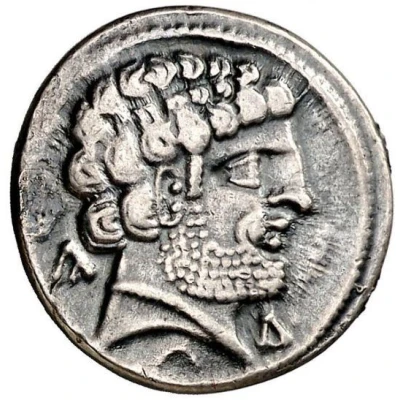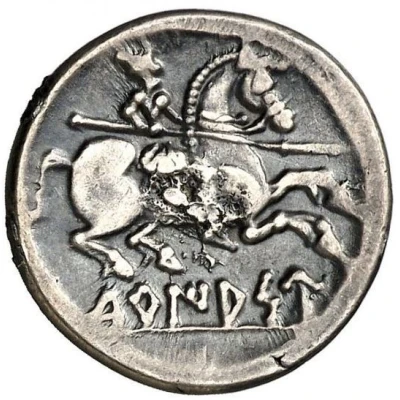


© Aureo & Calicó S.L., subastas numismáticas
Denarius 125 BC - 101 BC
| Silver | 3.9 g | 18 mm |
| Issuer | City of Turiasu (Lusones people) |
|---|---|
| Type | Standard circulation coin |
| Years | 125 BC - 101 BC |
| Value | 1 Denarius |
| Currency | Denarius (second half of the 2nd century BC) |
| Composition | Silver |
| Weight | 3.9 g |
| Diameter | 18 mm |
| Shape | Round (irregular) |
| Technique | Hammered |
| Demonetized | Yes |
| Updated | 2024-10-10 |
| Numista | N#154422 |
|---|---|
| Rarity index | 93% |
Reverse
Horseman riding right, wearing helmet and holding spear.
Script: Iberian (Celtiberian)
Comment
Obverse inscription:"Ka" in Northeastern (Levantine) Iberian script in left field.
"Tu" in Northeastern (Levantine) Iberian script in right field.
Reverse inscription:
"TuRIASU" written from left to right in Northeastern (Levantine) Iberian script.
16 pieces known according to 1718, page 328.
Interesting fact
The Denarius coin from the City of Turiasu (Lusones people) was used as a form of currency during a time of great cultural and economic exchange between the Roman Republic and the indigenous peoples of the Iberian Peninsula. The coin's design, which features a stylized image of a warrior on horseback, reflects the blending of Roman and native artistic styles during this period. Despite being made of silver, the coin was likely used for everyday transactions and had a relatively low value, reflecting the economic diversity of the time.